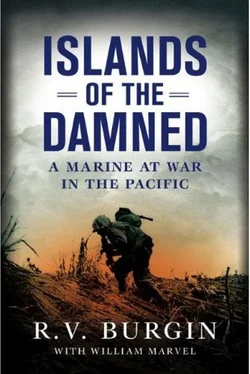Fortunately DUKWs had a double hull. But for two hours we were knocked around out in that bay. When we finally wallowed to shore, some of the men were so sick they took them to the hospital on New Guinea.
On Christmas Eve we boarded the USS Noel Palmer and sailed a hundred miles or so up the coast to Oro Bay, the main supply base. The Seventh Marines had already been there and gone. Here we learned we were being held in reserve for the assault on Cape Gloucester, New Britain.
Four days later General William Rupertus, the commander in charge of the invasion, called for his reserves, and K Company, Third Battalion boarded LST 204. There were about 150 of us. None had set foot on an LST before—we hadn’t trained on them. We walked up the ramp and they closed the big clamshell doors behind us, and off we sailed. I felt that we were like a boxer trained for his Friday night fight. We were ready. We had pulled enough maneuvers, done everything humanly possible to prepare every man for combat.
* * *
They’d started the invasion without us.
On the day after Christmas, while we were at Oro Bay, the Seventh Marines and the First and Second battalions of the Fifth Marines waded ashore on Cape Gloucester. Their objective was a Japanese airfield at the southwestern tip of New Britain. But instead of landing on the beach nearest the airfield, most of them had gone in several miles southeast, along the shores of Borgen Bay. This took the Japs by surprise, and our men landed without a shot being fired. But just beyond the narrow beach, where the invasion maps had indicated “damp flats,” they ran into a wall of jungle and a swamp. The flats were damp, all right, up to the Marines’ armpits.
Supplies from the LSTs piled up on the beaches as the Marines hacked and waded and swam through to solid land. Then they went on in driving rain to capture part of the airfield by December 30.
We landed the next morning, New Year’s Day.
By then engineers had bulldozed a path across the swamp and laid down logs to make a corduroy road. Supplies were moving. We were scattered but we were able to get together pretty quickly, and next morning we started a sweep inland, moving south and west. The Seventh Marines were somewhere ahead of us and on our left. By late afternoon we had gone a few miles without encountering a single enemy. We stopped for the night and were just starting to dig in alongside a little creek when about fifteen Japs popped out of the jungle on the other side. They came splashing through the water and the high grass, bayonets raised over their heads and screaming banzai!
I had been carrying the mortar base plate and didn’t have a rifle. I dropped the plate and pulled my .45 out quick—I don’t even remember drawing it—and fired, catching one of them in the chest. He was about thirty-five or forty feet away from me, still running when he went down. Other Marines were firing right and left and more Japs were stumbling, going down. The rest turned back to the woods. I don’t think more than one or two got away.
That was the first man I killed. I didn’t feel anything but relief. He didn’t get me. I got him.
After that episode, I always carried an M1 and my pistol. A pistol is fine if somebody’s up close, but I didn’t want anybody getting that close again. That attack broke me in right away.
We pulled off the creek and moved three hundred yards up a knoll and dug in again. It was a very nervous night. I couldn’t see a thing. In the dark the land crabs came out and started rustling around in the leaves, and I was half convinced that the Japs were coming any minute. Everybody was a little trigger-happy anyway after the banzai charge. In the middle of the night one of the guys crawled out of his foxhole, probably to take a piss, and our sergeant, Johnny Marmet, shot him. He was wounded, not killed, but we had our first casualty.
At daybreak moisture was dripping off the leaves. Everything was soaked, and a kind of gray-blue haze hung in the air, a spooky mist that hid everything beyond the closest trees. It would be there almost every morning, especially after a rain. I never saw anything like it anywhere else and I never got used to it.
We started out again. We were picking our way south through thick jungle without finding any Japs when we came under fire on our left. It turned into a pretty good firefight until somebody up the line realized that we had run into the Seventh Marines, Third Battalion. Before we got it stopped, one of our men had been killed. It wasn’t the only time we would encounter friendly fire, Marines shooting Marines. And when we did, it would again be from the Seventh Marines.
We had been advancing parallel to their Third Battalion when they had come up against a pocket of Japs that slowed them down. We went on without meeting any opposition and then began a swing back to the left. That’s when we suddenly appeared on their right, and they opened fire.
We all finally caught up with a large body of Japs dug in along the far side of a stream we came to call Suicide Creek. They were screened behind brush, and every time we tried to wade across, they just cut us to pieces. We lost a lot of good men there.
Jim Burke and I were holed up some distance to the right of where the Seventh Marines were trying to cross. There was a small break in the trees, hardly big enough to call a clearing, and we’d set up a five-gallon water can with a canteen cup on top. I got thirsty and walked over to get a drink, all the time watching out for myself. After I put the cup back on top of the water can and ducked back, Jim went over for a drink. He was just reaching for that cup when there was a shot and the cup flew off into the brush. I felt something hit my sock just in front of my ankle. I looked down and there was a fragment of bullet stuck there, still hot.
Jim took three steps straight back and turned to me and grinned.
“I don’t think I’m that thirsty,” he said.
We knew whoever had fired at us was above our heads, somewhere in the trees, most likely tied in, as we’d learned from the Guadalcanal veterans. We crouched there for a while scanning the branches but all we could see was a green wall of foliage.
I went off to find K Company’s .30-cal machine gunner.
“There’s a Jap sniper up there somewhere, Norman,” I told him. “He’s well camouflaged, but we know he’s there.”
Norman set up his tripod and swiveled his gun upward and cut loose, raking the trees back and forth. Bits of leaf and falling branches showered down. There was a sudden crack and a body dropped out of the canopy and jerked to a stop about twenty feet above the ground. When we left he was swinging there upside down with his rifle dangling beneath him.
Farther down the line the Seventh Marines were still hung up at Suicide Creek. The Japs were invisible, dug in behind earth-and-log bunkers or behind the roots that fanned out like walls from the base of the tallest trees. Bazooka shells would bounce off the bunkers without detonating, and we couldn’t use our mortars because of the forest canopy. The stream was about forty feet wide with steep banks. In the afternoon three Sherman tanks showed up, crashing through the underbrush, and stopped at the near edge of the stream. But the embankment was too steep, so a bulldozer was called forward to carve a ramp down to creek level. We heard later that a sniper shot the bulldozer driver out of his seat. Another Marine climbed up to take his place and he was shot, too. A third Marine ducked down behind the dozer and, somehow working the controls with a shovel and an ax handle, managed to finish the job. Next morning, January 4, the tanks churned across Suicide Creek and the Japs fell back and we all started moving forward again.
Читать дальше











